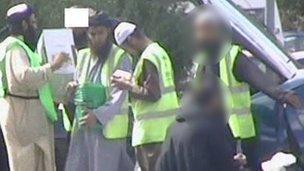Birmingham men guilty of mass bomb plot
- Published
The BBC's June Kelly reports on how the plot unfolded
Three would-be suicide bombers who plotted to carry out an attack to rival the 7 July and 9/11 atrocities have been found guilty of terrorism charges.
Irfan Naseer, 31, Irfan Khalid, 27, and Ashik Ali, 27, from Birmingham, were found guilty at Woolwich Crown Court of being "central figures" in the plan.
Jurors were told they planned to set off up to eight bombs in rucksacks, using timers to detonate the charges.
Police described the men as "committed, passionate extremists".
The trio were arrested in 2011 amid fears an attack was imminent.
Detectives believe it is the most significant terror plot to be uncovered since the 2006 conspiracy to blow up transatlantic airliners using bombs disguised as soft drinks.
Khalid even boasted that the attack was "another 9/11" and "revenge for everything".
'Charity workers'
The three men were found guilty of 12 counts of preparing for acts of terrorism between December 2010 and their arrest in September the following year.
The jury heard that Naseer and Khalid had received training from al-Qaeda contacts in Pakistan - and had recorded martyrdom videos there before returning to the UK.
Having recruited others, the group posed as legitimate charity workers on the streets of Birmingham and collected thousands of pounds from unsuspecting members of the public.
Naseer played a key role in sending four other Birmingham men to Pakistan to receive training. All of these have already pleaded guilty to preparing for acts of terrorism: Ishaaq Hussain, 21, Shahid Khan, 21, Naweed Ali, 25, and Khobaib Hussain, 22.
Two other Birmingham men who were part of Naseer and Khalid's plans, Rahin Ahmed, 27, and Mujahid Hussain, 21, have also pleaded guilty to terrorism charges.
The judge told the men they would all face life in prison when they were sentenced in April or May.
Mr Justice Henriques told Naseer he had been convicted on "overwhelming evidence" and that he faced "a very long minimum term".
He said: "You were seeking to recruit a team of somewhere between six and eight suicide bombers to carry out a spectacular bombing campaign, one which would create an anniversary along the lines of 7/7 or 9/11. It's clear that you were planning a terrorist outrage in Birmingham."
Surveillance recordings
BBC home affairs correspondent Dominic Casciani said the convictions represented a major success for counter-terrorism officers in the West Midlands who, along with MI5, ran one of the largest undercover operations in recent years to identity the plotters and stop them.
Nine men in all have been convicted as a result of the investigation.
Asst Chief Constable Beale: "They were out to cause some serious harm"
The jury heard that the security services had the men under such close surveillance that they recorded them laughing and joking about their plans and how they did not need to worry about their car's MOT, because they would be dead by the time it expired.
The men were arrested after recorded conversations revealed Naseer's depth of knowledge about bomb-making and the three discussed time frames for attacking targets.
They had discussed targets while under surveillance but had not settled on a final plan. During his police interview, Ali told detectives that they wanted to wear explosive vests and had considered attacking British soldiers.
The trial heard the men were inspired by sermons of US-born Islamist cleric Anwar al-Awlaki, who was killed in Yemen in September 2011.
'Maim and kill'
Karen Jones, specialist counter-terrorism prosecutor for the Crown Prosecution Service, said: "These men had dangerous aspirations and whilst the precise targets remained unclear, the potential for damage and loss of life from their plot should not be underestimated.
"The evidence we put to the court showed the defendants discussing with awe and admiration the attacks of 9/11 and 7/7. These terrorists wanted to do something bigger, speaking of how 7/7 had 'gone a bit wrong'."

The men carried out fraudulent charity collecting on the streets of Birmingham
Detective Inspector Adam Gough of West Midlands Police led the investigation into the men.
"There's no doubt whatsoever that they were the real deal," he said. "They are committed, passionate extremists. They had a real stated intention to kill and maim as many people as they possibly can. More than that, they not only had that intention, but they had the capacity and training to make that intention a reality.
"Naseer is a very devious and calculating man. He is someone who had a real hatred of western values, someone who wants to bring his influence to others and a compulsive liar. A very dangerous man."
Irfan Naseer told the trial that the hours of secret recordings of him talking about terrorism and bomb-making were all nonsense.
He said he had pretended to be a terrorist because he wanted to end rumours in his local community that he was a Pakistani spy. Ashik Ali denied wanting to be a terrorist. Irfan Khalid did not give evidence in his defence.
- Published21 February 2013
- Published21 February 2013
- Published21 February 2013